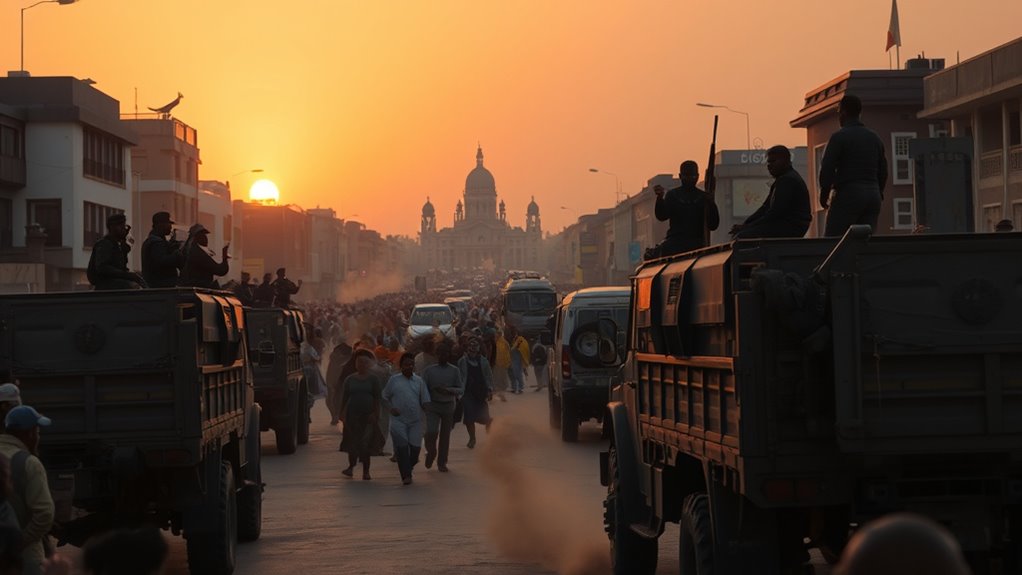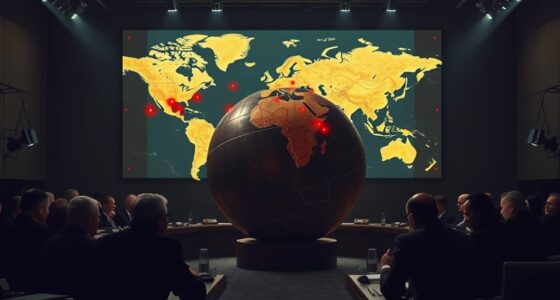In 2025, Africa’s wave of military coups threatens your understanding of the region’s stability and governance. You’ll see democracies weaken as military regimes take control, often citing security or corruption concerns. Citizens face repression, and regional stability suffers with increased conflict risk. International responses are inconsistent, further complicating efforts to restore democracy. If you pay attention, you’ll gain insights into the ongoing challenges and opportunities for building resilient, democratic institutions in Africa.
Key Takeaways
- The surge in military coups undermines democratic institutions, leading to increased political instability across Africa in 2025.
- Coup-driven regimes often restrict civil liberties, curtailing freedoms and stifling dissent, which weakens governance structures.
- Regional stability is threatened as neighboring countries face spillover violence, power vacuums, and potential for further coups.
- International responses are mixed, with some nations imposing sanctions while others overlook violations, affecting diplomatic cohesion.
- The ongoing wave hampers economic development, discourages investment, and deepens economic hardships for affected populations.

In recent months, Africa has experienced a surge in military coups, shaking the stability of several nations across the continent. This wave of military intervention has thrown into question the progress many countries made toward democratic governance. When soldiers step into power unexpectedly, it often signals a deeper frustration with civilian leadership, economic hardships, or security failures. These coups typically result in a democratic rollback, where elected governments are replaced by military juntas that prioritize control over democratic principles. As you observe this pattern, you realize how fragile democratic institutions can be when faced with internal and external pressures.
Recent African coups threaten democratic progress and highlight fragile institutions amid internal and external pressures.
The immediate consequence of these coups is a destabilization of political systems that were gradually building towards stability. Instead of democratic processes, you see military regimes imposing their rule, often citing national security concerns or corruption as justifications. However, this shift usually comes at the expense of civil liberties, free speech, and political pluralism. Citizens who once enjoyed the right to vote and express dissent now find themselves under military rule, with limited avenues for participation or redress. The rollback of democracy in these countries undermines decades of progress, creating a cycle where military rulers justify further authoritarian measures to maintain control.
You also notice that military intervention in Africa isn’t just a localized issue; it has ripple effects across the region. Neighboring countries may face increased instability, as power vacuums and weak democratic institutions encourage further coups or violent conflicts. International actors often respond with mixed signals—some condemn the military takeovers, while others may turn a blind eye, especially if the new rulers align with certain geopolitical interests. This inconsistent response complicates efforts to restore democracy and pushes the continent further into a cycle of authoritarian rule.
Understanding these dynamics, you see that the impacts of this coup wave extend beyond immediate political upheaval. The rollback of democratic gains affects economic development, human rights, and regional cooperation. Countries under military rule often face sanctions, diplomatic isolation, and reduced foreign aid, which deepens economic woes. Meanwhile, the populace endures uncertainty and repression, with many losing faith in civilian institutions. As Africa navigates this turbulent period, the challenge lies in rebuilding resilient democratic structures capable of resisting future coups and safeguarding the continent’s long-term stability.
Frequently Asked Questions
What Are the Long-Term Economic Impacts of These Coups?
You might face long-term economic impacts like ongoing instability and a decline in investments. Economic instability caused by repeated coups erodes investor confidence, leading to reduced foreign direct investment and slower economic growth. These disruptions can also increase poverty levels, strain public resources, and hinder development projects. Over time, this cycle weakens the economy, making recovery difficult and further impairing governance and stability in the region.
How Are Neighboring Countries Responding Diplomatically?
Like a ripple spreading across a pond, neighboring countries respond with cautious diplomacy. You see, they impose diplomatic sanctions to pressure coup leaders and engage in regional dialogues to restore stability. These nations aim to balance asserting influence without escalating tensions. By fostering communication and applying strategic sanctions, they hope to encourage peaceful transitions and prevent further instability, demonstrating that unity is essential for regional resilience and long-term peace.
What Role Does Social Media Play in These Coup Events?
Social media influence markedly shapes these coup events by spreading real-time updates and rallying digital activism. You see how platforms like Twitter and Facebook amplify unrest, organize protests, and challenge official narratives. This rapid dissemination of information can inspire both support and opposition, making social media a powerful tool for mobilizing citizens and influencing public opinion, ultimately impacting the stability and governance during these turbulent times.
Are There Regional Initiatives to Prevent Future Coups?
Imagine you’re in a time where regional cooperation is your best bet against chaos. You see countries partnering through diplomatic strategies, sharing intelligence, and strengthening security alliances to prevent future coups. These initiatives include regional bodies like ECOWAS and the African Union actively mediating crises and imposing sanctions. Your role is essential in supporting these efforts, ensuring collaboration remains strong and effective to maintain stability across the continent.
How Do Coups Affect International Aid and Development Programs?
Coups often lead to a reduction or suspension of foreign aid and development assistance, as countries and donors become wary of political instability. You might see aid programs being redirected or delayed, which hampers ongoing projects and long-term growth efforts. This destabilizes development initiatives, making it harder for nations to recover and progress. In turn, international aid becomes less predictable, affecting the stability and governance of affected countries.
Conclusion
As you follow Africa’s rising coup trend, remember that over 60% of recent coups occur in West Africa, highlighting regional instability. This surge threatens not just governments but also economic growth and citizens’ safety. Staying informed about these shifts helps you understand the continent’s evolving governance challenges. If this trend continues, it could reshape Africa’s future stability and development—making it essential for policymakers and citizens alike to find lasting solutions now.










